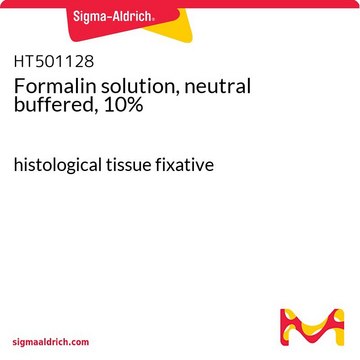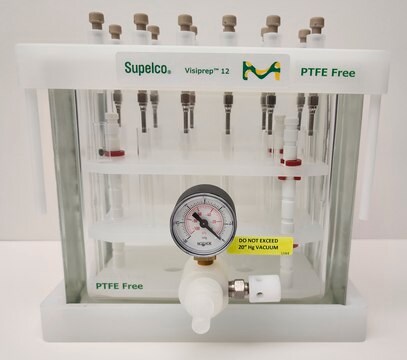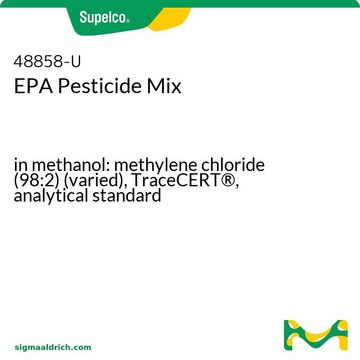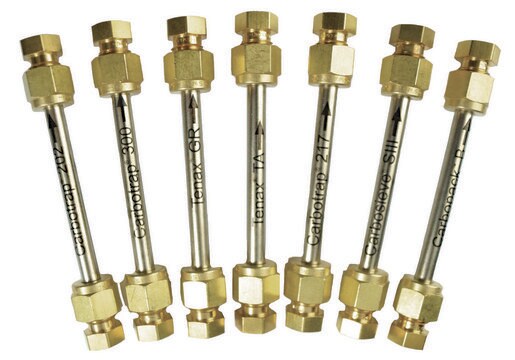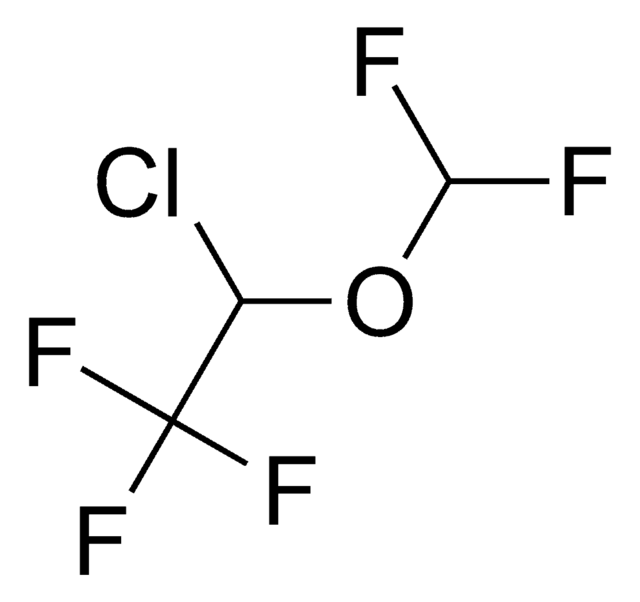53209-U
SupelMIP® Chloramphenicol solid phase extraction (SPE) Tube
bed wt. 25 mg, volume 3 mL, pk of 50
About This Item
Polecane produkty
product name
SupelMIP® SPE - Chloramphenicol, bed wt. 25 mg, volume 3 mL, pk of 50
Materiały
polypropylene tube
Poziom jakości
linia produktu
SupelMIP®
skład
bed wt., 25 mg
opakowanie
pk of 50
metody
solid phase extraction (SPE): suitable
pojemność
3 mL
Zastosowanie
food and beverages
Szukasz podobnych produktów? Odwiedź Przewodnik dotyczący porównywania produktów
Opis ogólny
The SupelMIP SPE line consist s of highly cross-linked polymers that are engineered to extract a single analyte of interest or a class of structurally related analytes with an extremely high degree of selectivity. This is possible because selectivity is introduced during MIP synthesis in which a template molecule, designed to mimic the analyte, guides the formation of specific cavities or imprints that are sterically and chemically complementary to the analyte(s) of interest.
By careful design of the imprinting site, either by molecular modeling, experimental design, or screening methods, the binding cavities can be engineered to offer multiple interaction points with the analyte(s) of interest. This leads to a stronger interaction between the solid-phase and the analyte(s). As a consequence, harsher wash conditions can be tolerated during SPE methodology resulting in cleaner extracts. Because extraction selectivity is significantly improved, lower background is observed allowing analysts to achieve lower limits of detection.
Visit www.sigma-aldrich.com/supelmip to learn more.
Zastosowanie
Chloramphenicol is a broad-spectrum antibiotic that is currently banned by a number of countries including the EU, the US, and Canada. This MIP phase and associated method offer a simple, efficient, and highly selective extraction method for quantiting chloramphenicol in food products and biological matrices. Detection limits well below the minim required performance limit (MPRL) are achieved consistently.
Cechy i korzyści
- Highly selective SPE for trace analysis in complex matrices
- Achieve lower detection limits
- Significant time and cost savings
- Improved MS-compatibility
Informacje prawne
Hasło ostrzegawcze
Danger
Zwroty wskazujące rodzaj zagrożenia
Zwroty wskazujące środki ostrożności
Klasyfikacja zagrożeń
Acute Tox. 4 Oral - Aquatic Acute 1 - Aquatic Chronic 2 - Eye Dam. 1 - STOT SE 3
Organy docelowe
Respiratory system
Kod klasy składowania
11 - Combustible Solids
Klasa zagrożenia wodnego (WGK)
WGK 1
Temperatura zapłonu (°F)
200.3 °F
Temperatura zapłonu (°C)
93.5 °C
Wybierz jedną z najnowszych wersji:
Masz już ten produkt?
Dokumenty związane z niedawno zakupionymi produktami zostały zamieszczone w Bibliotece dokumentów.
Powiązane treści
SupelMIP SPE opiera się na technologii polimerów wdrukowanych molekularnie (MIP). Każda faza SupelMIP oferuje dostosowaną do potrzeb selektywność ekstrakcji śladowych analitów w złożonych matrycach.
SupelMIP SPE is based on molecularly imprinted polymer (MIP) technology. Each SupelMIP phase offers tailor-made selectivity for the extraction of trace analytes in complex matrixes.
Nasz zespół naukowców ma doświadczenie we wszystkich obszarach badań, w tym w naukach przyrodniczych, materiałoznawstwie, syntezie chemicznej, chromatografii, analityce i wielu innych dziedzinach.
Skontaktuj się z zespołem ds. pomocy technicznej